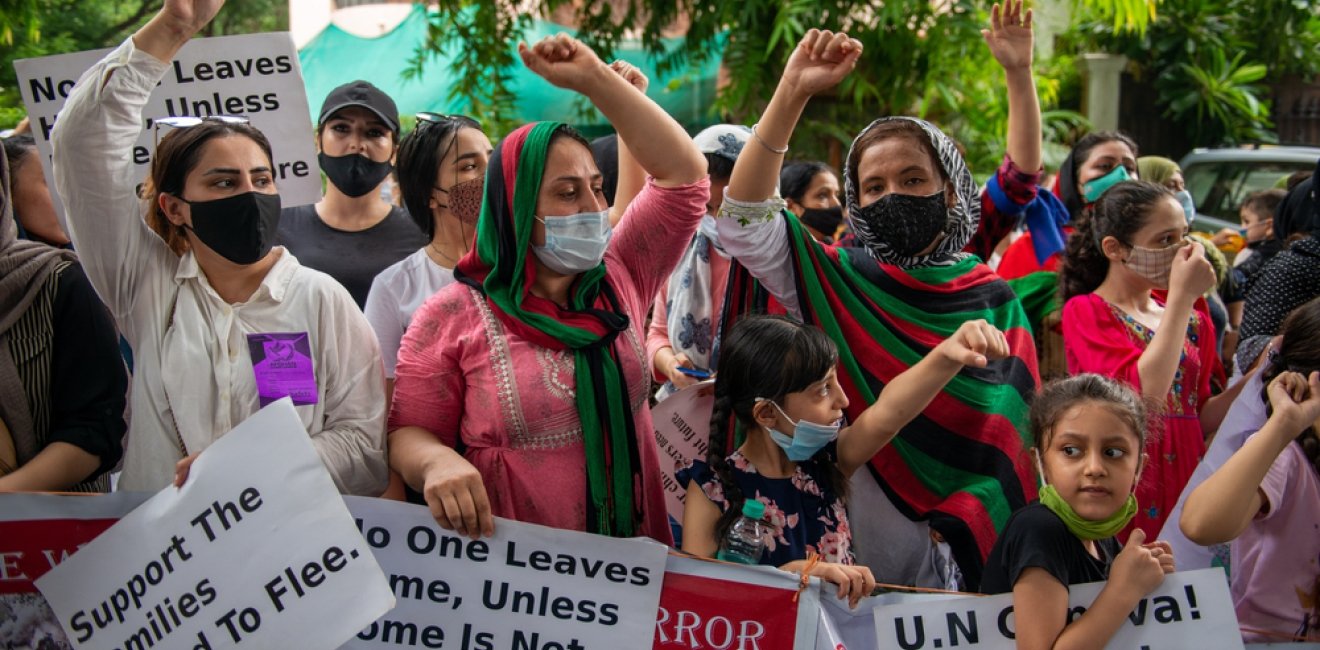The Taliban’s narrative and war against women dominate televisions, radios, and the internet. But over the past three years, Afghan women have been changing that narrative by stepping into their own stories and making their demands heard.
The room buzzed with conflicting dialogues and disagreements over controversial topics that women in Afghanistan have struggled with for years. One group voiced concerns about the influx of humanitarian aid over the past three years, criticizing the lack of monitoring mechanisms despite the deepening humanitarian crisis. Another challenged the role of women protestors, who have recently mobilized into a movement against the Taliban’s brutal war on women.
Some questioned the legitimacy of women in exile and their efforts to sustain the movement on the global stage, while others critically examined the unity within the movement and challenges it faces. Meanwhile, some participants listened quietly to what was perhaps the most vibrant, diverse, and chaotic—yet productive—gathering at the All Women Summit in Tirana, Albania, held September 11–15. For four days, the space was led, organized, and filled by women leaders, protestors, practitioners, journalists, and entrepreneurs from Afghanistan and around the world.
A historic gathering
After three years of collapse, women leaders in exile, despite facing resettlement challenges, continued their advocacy, while women in Afghanistan resisted the Taliban’s strict policies. For all of them, the summit was a historic moment that pushed the women of Afghanistan to move from grief to solidarity building and strategizing. Throughout the All Women Summit, participants not only witnessed distinct exchanges, vibrant discussions, and disagreements but also came together during meals to grieve what they had lost and to create moments of strength, listening to each other despite the hardships of the past three years. Walking the hallways, the sight of women with different styles, colorful clothes, and bold red lipstick symbolized their determination to stand tall and commitment to advancing the movement.
Women of Afghanistan showed resistance to change narratives in the past three years, and the All Women Summit in Albania legitimized their unity, solidarity, and goal to change life for women in Afghanistan. The summit’s resolution and the experience in Albania conveyed a unified message, addressing the criticisms of disunity and scattered approaches over the past three years. It was a pivotal moment for the movement, clarifying its next steps, confirming women’s priorities, and laying the groundwork for developing a women’s political manifesto.
In the past three years, the Taliban banned women from all their basic rights. Twenty years of achievements, including the establishment of systems and legal mechanism to protect women have been erased. The Taliban drastically put in place hundreds of decrees banning women from public spaces, the right to education and work, and freedom of movement and speech. They essentially criminalized women’s general movement in Afghanistan. The Taliban’s frightening law banning women’s voices in public spaces was among the most recent actions that showed the reality of their fight against women and discrimination of women’s basic human rights once more.
The Taliban’s narrative and war against women dominate televisions, radios, and the internet. But over the past three years, Afghan women have been changing that narrative by stepping into their own stories and making their demands heard. Now, they are taking to the international stage to tirelessly advocate for change and engage with international accountability mechanisms to transform the regional landscape and uphold the rights of women in Afghanistan. For instance, women protestors have shifted the narrative from victimhood to stories of strength and reclaiming agency. They have organically formed and sustained grassroots movements to display resilience and resist the Taliban’s policies. This approach differs significantly from the experiences of women during the first Taliban takeover in 1996. Three years of resistance have been long and exhausting for the protestors and the movement at the international level, marked by constant loss, ongoing struggle, limited resources, and a lack of security or protection.
The “Bread, Work, Freedom” movement has a clear message from within. Chanting on the streets of Kabul for their rights and freedom, the movement builds on 20 years of work and investment from the international community. While the Taliban has not been stopping their policies, the “Bread, Work, Freedom” movement is a symbol of defiance against the Taliban’s control of the country by force, pushing women in their homes, and creating collective trauma for the population of Afghanistan. On one hand, these protests are applauded and receive international recognition; on the other hand, there has not been much change in Afghanistan for women.
International accountability mechanisms
What women face in Afghanistan is unprecedented, and experts are navigating different international tools, laws, and mechanisms to address violations. In March 2023, jurists, women activists, women leaders, and organizations started a campaign “calling all member states to recognize the crime of gender apartheid to counteract and end the systems of apartheid currently in place in Iran and Afghanistan.” In the past year and half, the campaign addressed issues such as education and the right to work and tracked all Taliban’s decrees against women to use in the international legal mechanism of UN’s 6th Committee on Crimes Against Humanity Treaty.
On October 10, the 6th committee started to discuss the convention and see if the treaty, which is set to conclude in 2026, will move forward to formal negotiation. The campaign is pushing for member states codify gender apartheid in the treaty on crimes against humanity. Legal experts argue that recognition of gender apartheid under the international law will tackle phenomena of systematic crimes against women that shows domination and oppression. It is this systematic oppression in Afghanistan that distinguishes gender apartheid from gender persecution under the international law.
In September 2024, Canada, Germany, the Netherlands, and Australia, supported by many other countries, warned the state of Afghanistan of its violation of women’s rights would trigger an automatic referral to the International Court of Justice (ICJ) unless their policies are changed. This is an unprecedented announcement, as no countries in the history of the Convention on the Elimination of All Forms of Discrimination Against Women (which Afghanistan signed in 2003) were ever brought to the international’s highest court. The Taliban proudly rejected the warning and claimed that they have not been violating any laws and that human rights in Afghanistan are protected.
While the movement, experts, and member states use various tools to hold the Taliban accountable, the following recommendations are essential to consider when addressing the issues faced by women in Afghanistan. These recommendations are intended for both the women of Afghanistan and the member states engaging with the Taliban through different processes and mechanisms.
Recommendations for the women of Afghanistan
Platforms such as the All Women Summit in Albania should be further developed, and Afghan women should use them as opportunities to expand the resolution’s action points. This work requires cohesive financial support. The next summit should already be in the planning stages, ideally taking place in a regional country, such as Türkiye.
A women’s political manifesto should be initiated, as Afghanistan will soon face critical events like the 4th round of the UN Doha Process (Doha 4) and proceedings at the International Court of Justice (ICJ).
Given the movement’s challenges with unified messaging and cohesion, Afghan women must sustain their engagement through conferences, strategic partnerships, and media platforms. Writing, sharing, and maintaining their narrative is essential to strengthening their position within the international community.
The movement must engage strategically with partners shaping the Doha 4 agenda, ensuring that discussions on Afghanistan include the voices of women. The agenda should serve the needs of all Afghan people, rather than focusing on narrow, specific areas.
Women inside Afghanistan and those in exile should push for constructive dialogue. Building solidarity through open conversations will strengthen the movement and unify strategies for future political decisions affecting Afghanistan.
Activists, organizations, and key actors should closely monitor the ICJ process and actively engage in consultations with countries such as Germany, Canada, the Netherlands, and Australia.
Recommendations for member states
The UN Doha Process on Afghanistan has not proven to be a successful platform for measuring impact or holding the Taliban accountable. Therefore, member states should not exclude Afghan women from these discussions, especially given the lessons learned from Doha 3.
Over the past three years, Afghan women have faced ambiguity regarding the engagement process with the Taliban and have not had clarity on the UN Doha Process. Moving forward, the international community should treat this as a lesson learned and provide clear guidelines on what engagement entails, along with outlining both long-term and short-term objectives.
With the upcoming Doha 4, the announcement of the ICJ proceedings, and the 6th Committee’s consideration of the treaty, member states should discuss and establish cohesive guidance in the UN Security Council. This guidance should be integrated into the UN-led process for Afghanistan. Afghan women perceive a paradox in the international community’s approach to addressing women's issues in the country.
Gaisu Yari is a fellow at the Wilson Center and a former civil service commissioner in Afghanistan. She is currently leading the Afghan Voices of Hope Project.
The views represented in this piece are those of the author and do not express the official position of the Wilson Center.











